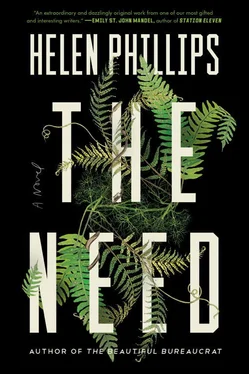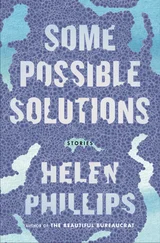The keys the key.
The kidnapper led her up a paved walkway. She heard him fingering the key chain that had so recently been in the ignition. He unlocked a door. She tried to remember all the doors that could be unlocked with the keys on her key chain. Their front door. Their back door. Their car. David’s basement studio. The Phillips 66. Her locker at work.
The kidnapper pressed her through the door and relocked it behind them. She recognized the smell of the room but couldn’t place it.
She had the urge to yank off the blindfold yet also felt somehow safer in this artificial dark, letting her other senses be the courageous ones for a change. The smell of cinnamon, old fabric, Clorox, dried-out dirt.
Dried-out dirt. Of course. Aunt Norma’s kitchen. The deer knew all her secrets. Her botched plant-watering duties.
The kidnapper guided her to the table. She could see it in her mind’s eye as she sat: the red-and-white-checkered seat cushions. The stove with the tarnished copper kettle. The window bars, remarkable in their ornateness (not long ago she had sat right here drinking tea with Norma, had thought how funny it was that something made to protect you from violence was also made so pretty). She had always loved Norma’s kitchen, old-fashioned with its hutch and teacups, clichéd and cozy. It was no place for a kidnapping, no place for a murder.
The kidnapper took Norma’s seat at the round table for two. He reached across the table and pulled the sweatshirt blindfold off her eyes.
She found herself face to face with herself.
She witnessed herself: the same uneven eyebrows and recently emerged wrinkles on the forehead. The same hexagon stud earrings she had been wearing every day for the past month. The dark cropped hair on the brink of needing another haircut. The angle of the nose; the placement of the mole on the neck. The color of the eyes, the capillaries showing in the whites of the eyes, the slight bags under the eyes.
She stared at her self and her self stared at her.
She was struck by their sole difference: the other woman bore a long, thin scab stretching from her right temple down to the chin. Instinctively Molly touched her own cheek, as you would if you noticed an inexplicable wound on your face in the mirror, but her skin was undisrupted.
The overhead light was too much to bear.
Molly looked down, trying to take refuge in the sight and solidity of her thighs, her knees, but they no longer quite felt like hers.
The woman stood and turned on the strawberry lamp on the hutch and turned off the overhead light and stepped to the stove and flicked on the burner beneath the kettle.
Molly realized then that the woman was wearing her old black jeans, the comfortable ones with twin holes at the crotch. She had searched for them last weekend, to no avail, pawing through every drawer in her dresser.
“My jeans,” Molly said. The words sounded ridiculous, pitiful, in the silent room.
The woman studied her coolly from her spot beside the stove.
Molly focused on the fridge, the small magnetized whiteboard Aunt Norma used to write reminders to herself. It bore one word now, in blue ink, all capitals: BLOOD .
“I’ll go by Moll,” the woman said, her tone magnanimous.
Molly had always resisted that particular nickname.
“Moll,” the woman repeated. “Moll. Maul. Mal.”
Or maybe Molly just imagined the migration to the Spanish word for evil . But the woman’s voice did grow more venomous with each repetition. Molly thought to fear the heating water, the boiling threat that could arc across the kitchen to burn her face.
“It’s just because Norma has to have her blood drawn when she gets back from Arizona,” Moll explained, her composure returned. “Earl Grey?”
Molly never drank caffeinated tea at this hour.
“Decaf,” Moll clarified. Molly listened to the sound of her own voice emerging from the skull of another. “Not that you’ll be going to sleep anytime soon.”
Molly looked at the door. Moll watched Molly looking at the door.
“It sounds so civilized,” Moll said, sitting back down in the chair across from her, “but what a savage drink. Pour hot water over dry leaves, add to it the milk intended for the young of another mammal.”
She delivered this with a knowing smile; a visceral shiver shook Molly.
As she tried to resettle her body, Molly heard, in the far distance, Ben wailing in his sleep. But it was just an ambulance on the thoroughfare. Sirens (she realized only after becoming a mother) resemble the sound of a baby crying; surely no accident.
“Ben,” Moll said.
It made Molly uneasy, the ease with which the woman said her son’s name.
“You can read my mind?” Molly said.
“It’s my mind.”
“Where did you come from?”
At first it seemed that Moll was going to ignore the question. She sat with her hands clasped together on the tabletop. Her cuticles, Molly saw, were bloody, the nails ravaged by teeth.
Then, after a moment, Moll retrieved the twin key chain from the pocket of the jeans and placed it on the table between them.
“You know,” Moll said.
“I know?”
“Yes.”
“Where you came from?”
“The seam.”
“The what?”
“The seam.”
“The seam?”
“The Pit.”
“The Pit is a seam.” Molly intended it as a question, but it came out sounding like an assertion.
“Between possibilities,” Moll continued. “Between different possible worlds.”
“You came through the Pit?” Molly said, a dizzying dread rising in her.
Moll stood and ran to the stove, as though in response to the whistle, but the kettle had yet to reach full boil. She tapped the kettle, the hot part, with the palm of her right hand.
When the kettle screamed, Moll put tea bags in mugs and poured steaming water and poured milk. She carried both mugs over to the table. Only one of the mugs had milk in it. She placed the milky one in front of Molly and kept the black one for herself.
“You don’t take milk in your tea?” Molly said.
“No.”
“Then we aren’t the same,” she said. “I wouldn’t drink this without milk.”
“I used to be that way,” Moll said.
“We aren’t the same,” Molly repeated.
“The Queen of the Elk,” Moll said.
Molly hadn’t mentioned her labor hallucination to anyone, not even to David; had left it behind in the haze of the hospital until this moment, when it rushed back over her—as her delivery of Viv approached, her inhabitation of the body of a great female elk bellowing on a grassy hilltop. She remembered the sublime pain, the big window at the hospital beyond which the sun kept setting. There was a storm or there had been a storm and there were black branches blown against a brightly glowing and darkly glowing sunset that went on and on and on and from the tip-top of her pain she demanded of David, Why is the sun still setting? and he said, What? But before she could repeat herself she had to hurry back to blow the great horn of the Queen of the Elk. Later, when she asked him what time it was, he said 6:23 , and then when she asked him again seven hours after that, he said 6:24 , and then when she asked him again three minutes after that, he said midnight .
Molly felt hot, overheated. How absurd it sounded now, the Queen of the Elk , yet how essential it had felt at the time, four years ago as of tomorrow.
“Six twenty-three and six twenty-four,” Moll said, “seven hours apart. Tomorrow her—” She stopped.
“Your life is identical to mine?”
“It was .” Her gaze was cold, condescending.
Читать дальше





![Unknown - [Carly Phillips] The Bachelor (The Chandler Brothe(Bookos.org) (1)](/books/174132/unknown-carly-phillips-the-bachelor-the-chandle-thumb.webp)






